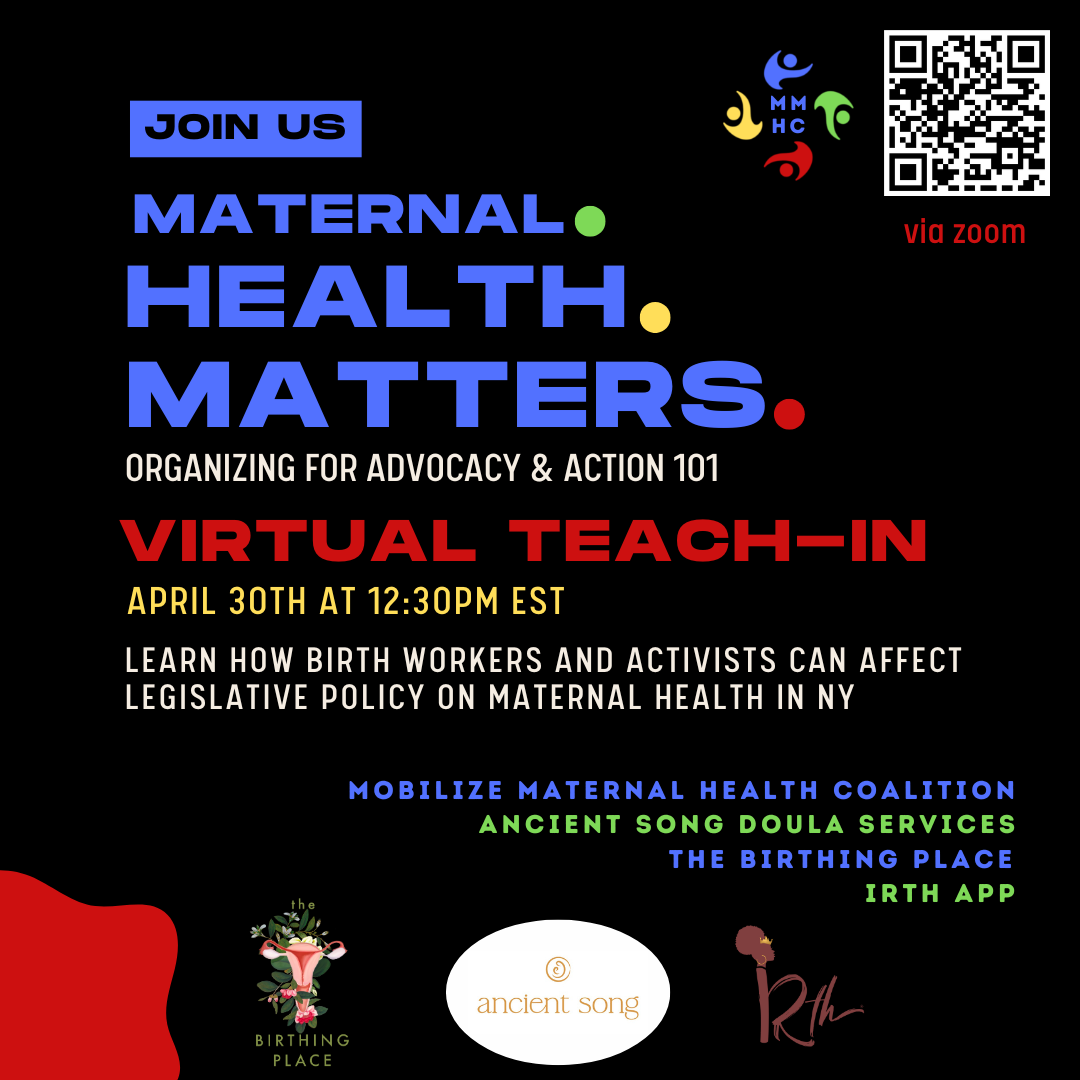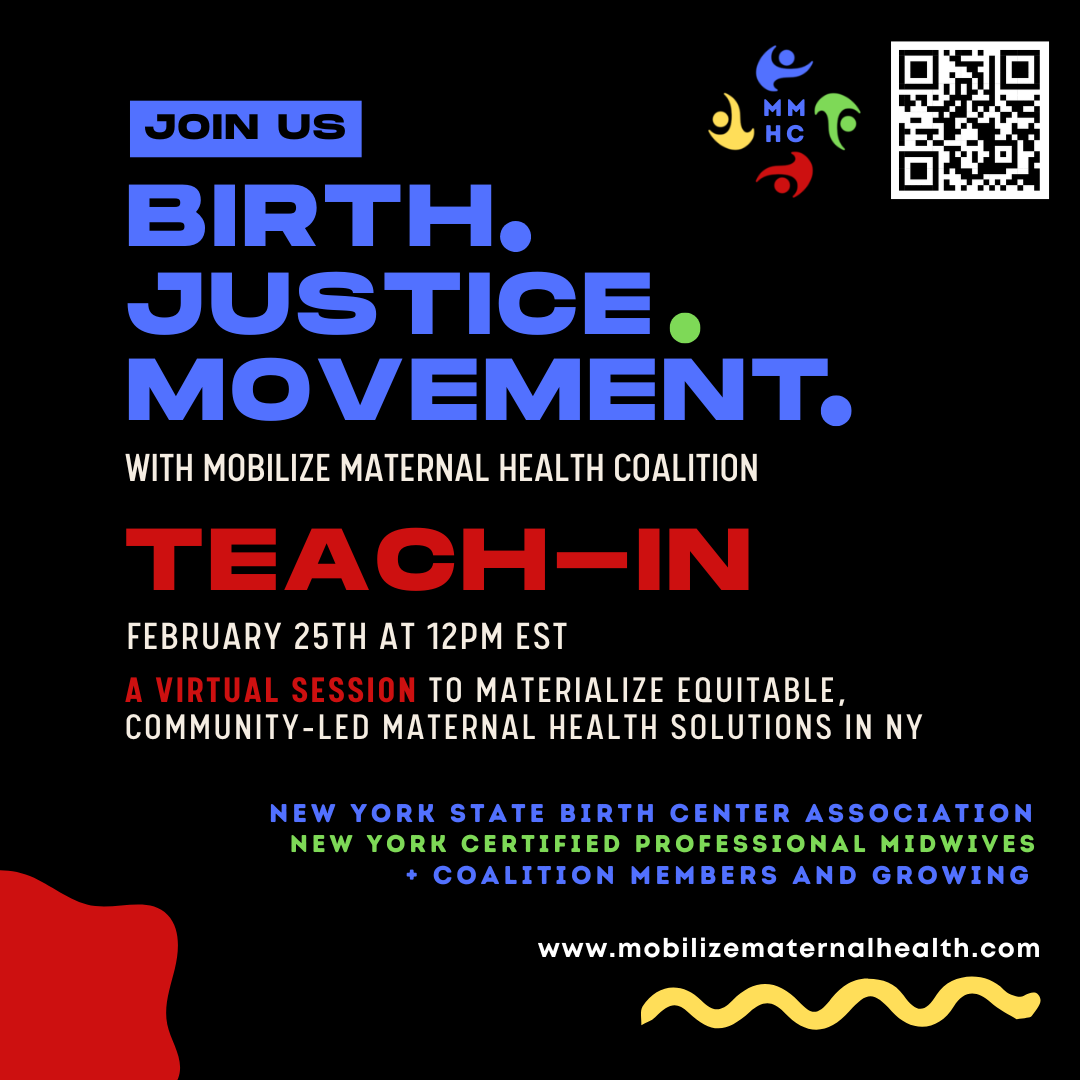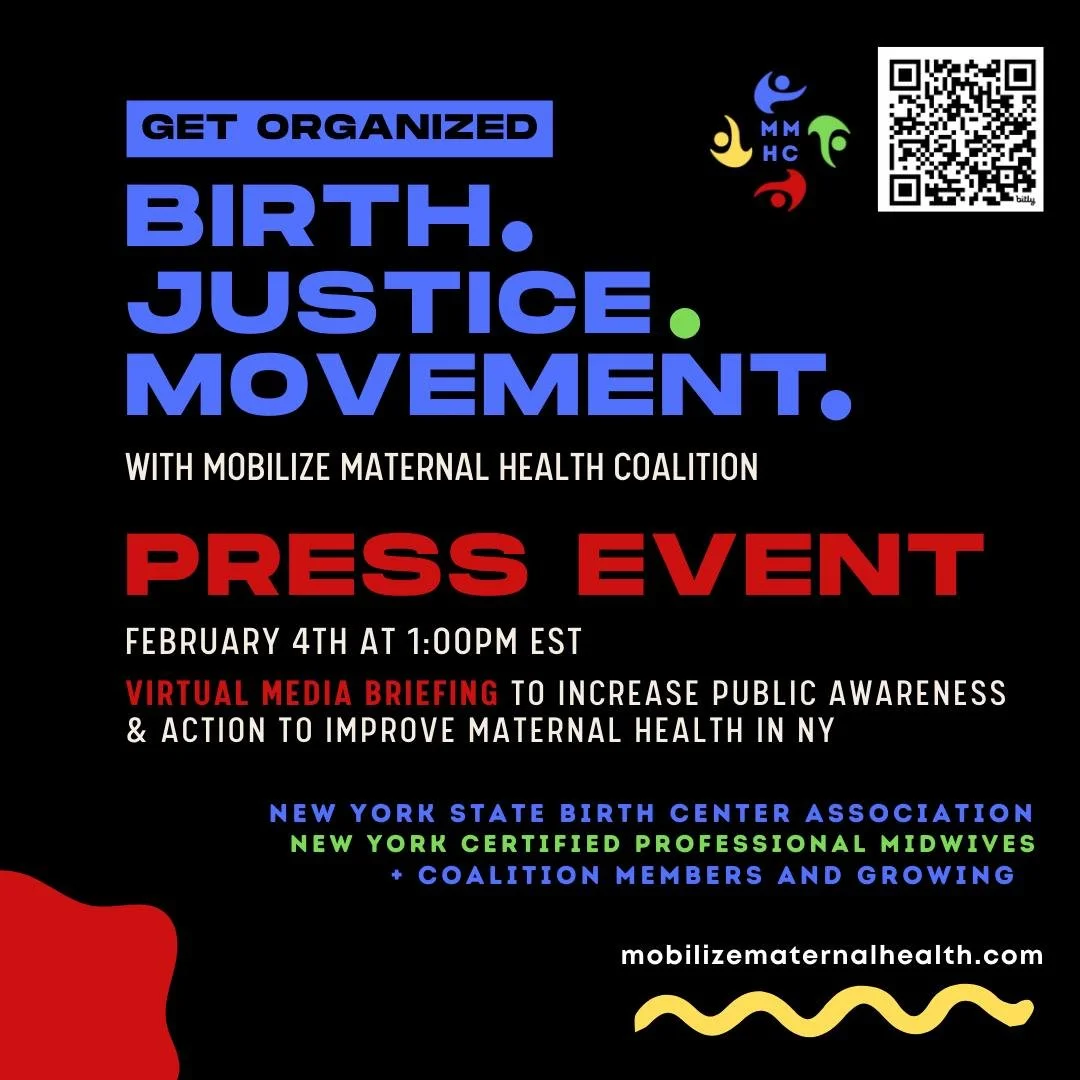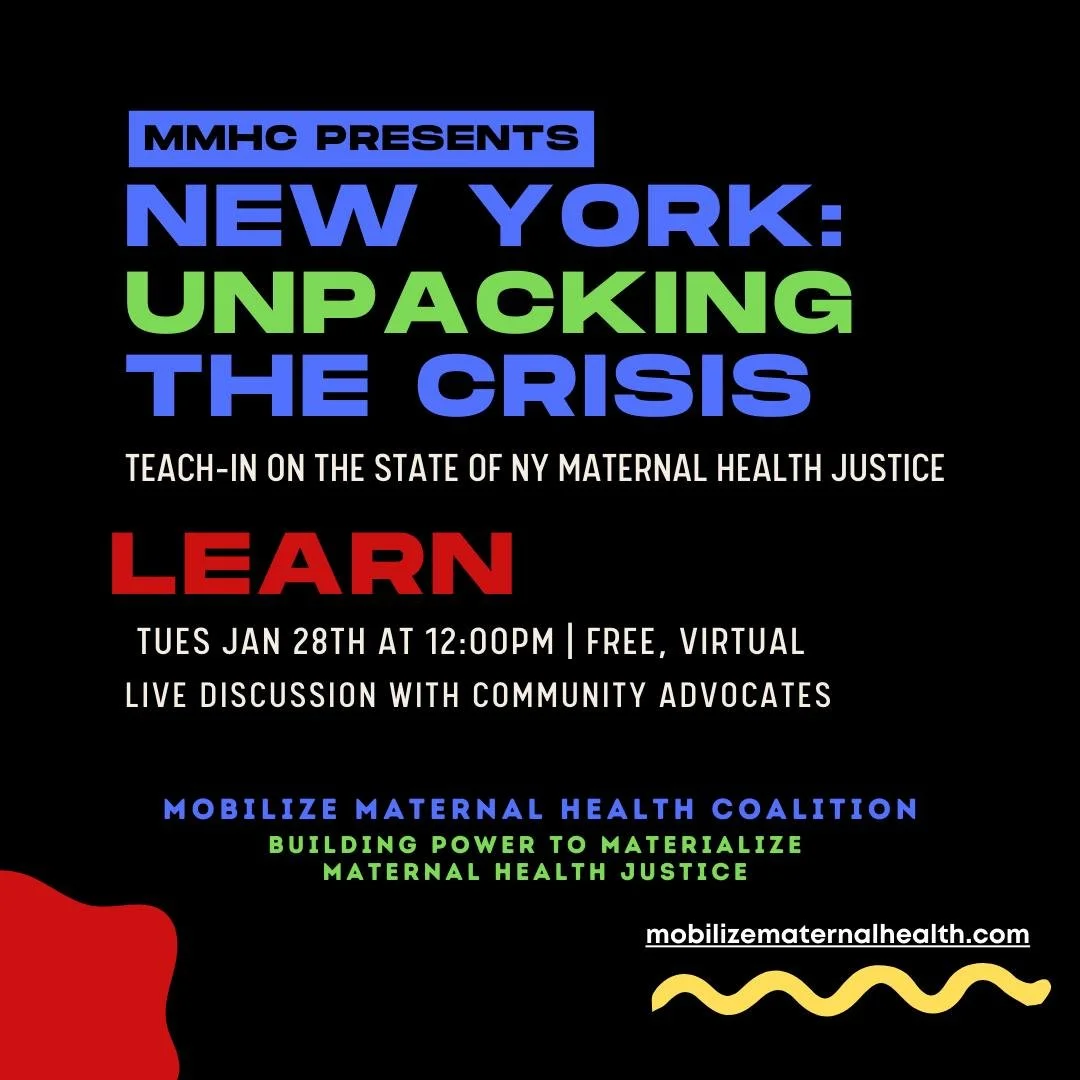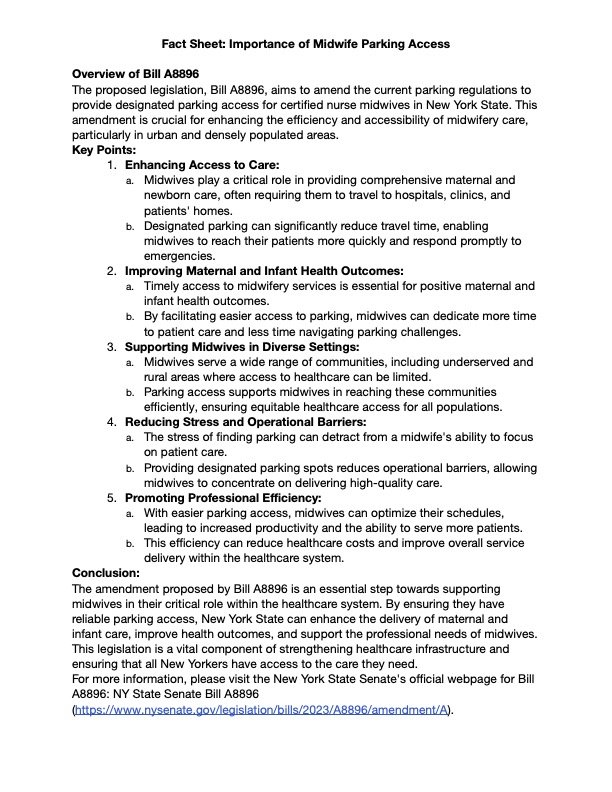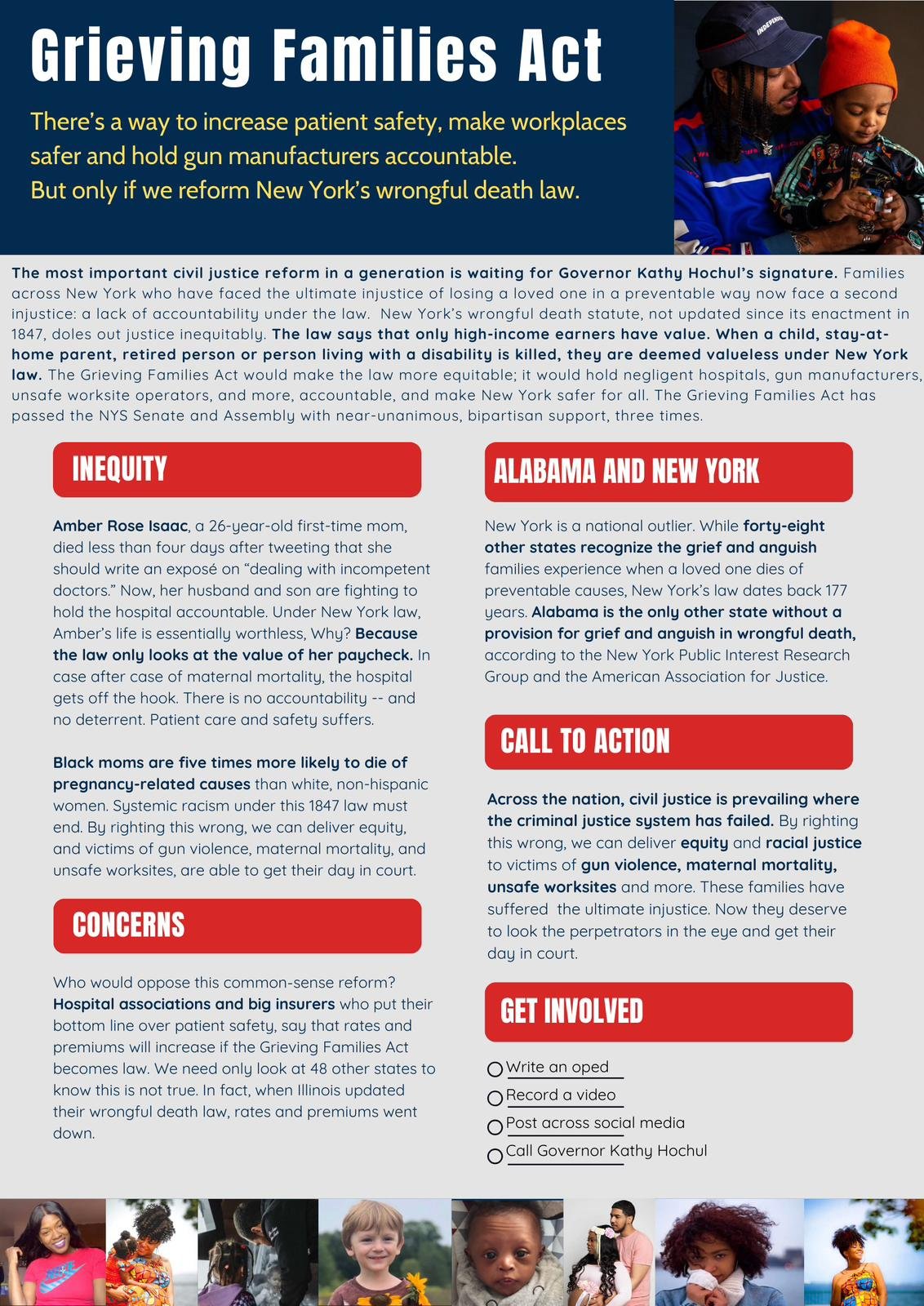Mobilize Maternal Health Coalition
Building power to materialize maternal health justice.
New York’s Maternal Crisis
Racial disparities in maternal mortality and morbidity, climbing cesarean section rates, lack of out-of-hospital birthing options, lack of healthcare coverage, and criminalization of community midwives have led to a public health crisis for birthing people in New York State.
Events
Current Policy Initiatives
MMHC's group of reproductive justice organizations, public officials, and advocates are currently embarking on their Empowering Reproductive Justice campaign to address the urgent maternal healthcare crisis in New York. We believe that, together, we can increase greater awareness and put the necessary pressure on lawmakers to take action on bills related to maternal healthcare.
Read a one-pager summarizing our current iniatives:
To learn more about each, see the one-pagers on each topic below:
On-going Policy Initiatives
Establish access to community maternal health and elimination of racial disparities as a public health priority
As a state with immense resources and power, establishing priorities that communicate that the state will not accept racial inequities in maternal outcomes will signal to all New Yorkers that their executive branch will support and fight for them. Further, by stating that all birthing people in the state have access to respectful community level maternal healthcare, the executive has the power to reframe how maternal healthcare is delivered to the birthing people of New York.
Eliminate barriers to midwife-led birth centers
Even after landmark NYS legislation in 2016 legalizing midwife-led birth centers, NYS midwives have not been able to open birth centers due to restrictive NYS Department of Health regulations. These regulations and the licensure process must be amended so as to follow national accreditation guidelines rather than the current burdensome NYS Certificate of Need (CON) process that was meant to apply to large-scale hospital facilities, not smaller community centers. To further support birth centers, hospitals should be required to maintain a hospital transfer agreement with their closest birth center; collaborate with the birth center on best transfer protocols; and offer training on out-of-hospital birth for hospital staff who will be accepting transfers.
Click here to learn more about the need to remove barriers to midwifery-led birth centers.
Expand and diversify community midwifery care
Community-based midwifery care can improve maternal health outcomes and patients’ experiences while also potentially reducing costs and benefiting those most at risk – particularly people of color and those with low incomes. This crisis calls for the creation of a network of community-based, publicly-funded neighborhood clinics that offer low-cost or free prenatal, postpartum, and newborn care. To create a midwifery workforce that reflects the demographics of the population served, NYS must also invest to diversify the midwifery workforce by facilitating scholarships and recruitment for student midwives from communities of color, LGBTQ communities, and immigrant communities; and creating a pathway for immigrant midwives to practice in NYS. CPMs, whose demographics are more diverse than current licensed midwives in NYS, specialize in community birth and are licensed in 37 US states; currently criminalized in NYS, CPMs must be given a path to licensure. Currently, midwifery education in NYS is largely undertaken by private universities with high costs. NYS can alleviate the burden of entry into midwifery programs through the creation of a “pre-mid” program at CUNY, that offers midwifery school prerequisites, and the creation of a Direct-entry Midwifery School at CUNY, where midwifery education would be more widely accessible. Studies have also shown that in-home community prenatal and postpartum care reduces disparities and improves outcomes, and NYS can invest in creating an in-home prenatal and postpartum visiting midwife program for all births. Finally, NYS must fund and reinstate midwifery programs in all public hospitals to ensure access to midwifery care.
Click here to read more about the need to expand and diversify midwifery care.
Stop Revoking Paid Family Leave after Stillbirth
A dangerous loophole in New York’s Paid Family Leave (PFL) Policy excludes stillbirth, leaving mothers and birthing people - just days after birthing and burying a child - without access to the paid time they were granted to heal physically and emotionally. Up to 4 NY families each day are being forced to choose between keeping mothers safe in the most dangerous 6 weeks after birth (when 2/3 of NY's postpartum maternal deaths occur), or putting food on their family's table. Many have no choice but to return to work while still bleeding, engorged, and recovering from an extremely traumatic event. This disproportionately affects Black women, who are already at 9 times higher risk of maternal death in NYC, and twice as likely to experience a stillbirth. Given that all women who have a stillbirth are at almost 5 times higher risk of severe, potentially life-threatening maternal complications, this cruel and inhumane gap in paid leave is quite literally leaving BIPOC women's lives hanging in the balance.
Click here to learn more about the urgent need to close the PFL loophole for stillbirth families.
Create a central publicly accessible database of maternal statistics
Implementation of a central state-level data dashboard – much like California’s Maternal Data Center – that pulls rapid-cycle data every 45 days from a low-burden data systems to track maternal and neonatal health outcomes at all birth centers and hospitals including maternal, fetal, and child deaths; third trimester fetal losses; stillbirths; and birth-related injuries (including maternal injuries during childbirth).
Increase representation of birth justice advocates at the governance level
Grassroots birth justice advocates have been consistently under-represented at the executive level in health departments. NYS must consult, employ, and partner with advocates to inform legislative and regulatory change in order to make progress on the maternal health crisis.
The Birthing Place Foundation is a founding organizational member of the Mobilize Maternal Health Coalition and leads the administrative management of the coalition. TBPF is a non-profit organization born out of community-driven efforts to improve health outcomes for marginalized communities. We empower and engage communities through outreach, advocacy, and culturally responsive reproductive care, expanding birthing options in NYC and New York State.


